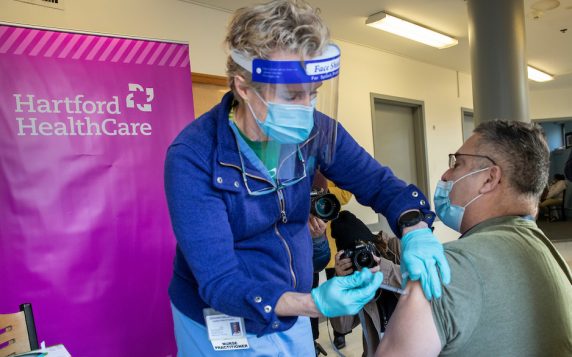Ray Lavery, approaching age 50 with a satisfying and successful career and two adopted children, suddenly realized he could do what he wanted with his body.
The London management consultant, a native of Dublin, came out as gay 25 years ago, although that didn’t adequately reflect how he felt. “Lesbian,” however, was “the closest thing there was” for someone feeling misidentified since birth.
“I was told from a young age that changing gender was not possible, so to just get on with it. So I was getting on with it. But, at age 45, I had an epiphany moment and I couldn’t push all the feelings back inside,” said the transgender male, who recently traveled to Connecticut to have gender affirmation surgery at Hartford HealthCare. “For me, it’s all or nothing.”
The transatlantic journey was necessary after Lavery learned the United Kingdom public health system had a six-year waiting list, just for an initial consultation for gender affirmation surgery. Even then, people have no choice in the provider they’re assigned.
“That sent me on a research trip around the world,” Lavery said while recuperating from surgery in Connecticut before flying home to London. “The reputation of the United States is that medication is expensive and the system is difficult to navigate, which I haven’t found to be the case.”
Apart from getting a top-notch surgeon, the most important thing for him was the connection with the provider. He wanted someone to treat him like a person.
“I believe you’re a person long before you’re a gender,” he said simply.
His research brought him to Dr. Laurel Chandler, a plastic surgeon in Darien. She performed a bilateral double mastectomy to remove breast tissue. Genital reconstruction, Lavery said, will come eventually.
In the days after the procedure, he reflected on his journey.
“I always knew. At the age of 2, I resisted dresses. I was told I’d be a tomboy and grow out of it eventually. You get used to that type of existence. There were no other people around like me,” Lavery said.
A few years ago, while doing some yard work at his mother’s house in Dublin, he got sap in his hair and couldn’t get it out. He was forced to cut the tresses very short. The image staring back from the mirror was jolting.
“I thought, ‘There you are!’” he exclaimed. “I couldn’t hide it anymore. I couldn’t live in a lie anymore.”
The first step was taking hormones to help alter his body, voice and appearance from female to male, although people were still mistaking him for a woman before his surgery after 10 months on testosterone.
The challenges he faced prompted Lavery to finance a documentary of his story, including having cameras filming Dr. Chandler in action in the operating room. He also runs a Meetup support group in London that gathers transgender people together in a safe place, so they can make friends and not feel so alone. He is writing a book on coming out and answering all the questions people ask about being transgender; and he plans to create educational materials to help others find their way.
The materials, he said, will help people going through transition at different levels to hopefully decrease the emotional pain they experience along the way. Topics will include socialization techniques, makeup use, fitness, nutrition tips and anything else that will help transgender people.
“I feel safe to talk about things, and decided to create a documentary to answer a lot of top surgery questions for people who would like the support,” Lavery said. “It’s to help demystify everything because there’s a real gap for transgender people and those who are supporting them.
“Anything I can do to make this part of the norm. There’s a lot of carnage out there – when I first came out 25 years ago as a lesbian, I destroyed a lot of things because I didn’t know what I was doing. I lost friends, clients and felt so alone. But, I know more now.”
This transition is a journey, not just for Lavery, but for everyone close to him. He said that anything he can do to help people adjust and understand it will help make the world a better more compassionate place.


